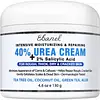What's inside
What's inside
 Key Ingredients
Key Ingredients

 Benefits
Benefits

 Concerns
Concerns

 Ingredients Side-by-side
Ingredients Side-by-side

Water
Skin ConditioningUrea 40%
BufferingParaffinum Liquidum
EmollientTriethanolamine
BufferingCocos Nucifera Oil
MaskingDodecane
PerfumingSalicylic Acid 2%
MaskingCetearyl Alcohol
EmollientPolysorbate 60
EmulsifyingGlyceryl Stearate
EmollientPEG-100 Stearate
Aloe Barbadensis Leaf Juice
Skin ConditioningCamellia Sinensis Leaf Extract
AntimicrobialMelaleuca Alternifolia Leaf Oil
AntioxidantGlycerin
HumectantAllantoin
Skin ConditioningCarbomer
Emulsion StabilisingEthylhexylglycerin
Skin ConditioningCaprylyl Glycol
EmollientHexylene Glycol
EmulsifyingPhenoxyethanol
PreservativeCeteareth-2
EmulsifyingWater, Urea 40%, Paraffinum Liquidum, Triethanolamine, Cocos Nucifera Oil, Dodecane, Salicylic Acid 2%, Cetearyl Alcohol, Polysorbate 60, Glyceryl Stearate, PEG-100 Stearate, Aloe Barbadensis Leaf Juice, Camellia Sinensis Leaf Extract, Melaleuca Alternifolia Leaf Oil, Glycerin, Allantoin, Carbomer, Ethylhexylglycerin, Caprylyl Glycol, Hexylene Glycol, Phenoxyethanol, Ceteareth-2
Urea
BufferingWater
Skin ConditioningParaffinum Liquidum
EmollientPropylene Glycol
HumectantTriethanolamine
BufferingMethyl Glucose Sesquistearate
EmollientPEG-20 Methyl Glucose Sesquistearate
EmulsifyingPrunus Amygdalus Dulcis Oil
Skin ConditioningSalicylic Acid
MaskingCarbomer
Emulsion StabilisingLactic Acid
BufferingPhenoxyethanol
PreservativeEthylene Brassylate
MaskingTocopheryl Acetate
Antioxidant
 Reviews
Reviews

Ingredients Explained
These ingredients are found in both products.
Ingredients higher up in an ingredient list are typically present in a larger amount.
Carbomer is a polymer of acrylic acid. Its main role is to create a gel consistency.
A high amount of carbomer can cause pilling or balling up of products. Don't worry, most products contain 1% or less of carbomer.
Paraffinum Liquidum is also known as liquid paraffin. It is a type of highly refined mineral oil.
Like other oils, Paraffinum Liquidum has emollient properties. Emollients help soothe and soften the skin. By creating a barrier to trap moisture within, emollients help keep your skin hydrated.
Paraffinum Liquidum does not irritate the skin and is non-comedogenic.
Learn more about Paraffinum LiquidumPhenoxyethanol is a preservative that has germicide, antimicrobial, and aromatic properties. Studies show that phenoxyethanol can prevent microbial growth. By itself, it has a scent that is similar to that of a rose.
It's often used in formulations along with Caprylyl Glycol to preserve the shelf life of products.
Salicylic Acid (also known as beta hydroxy acid or BHA) is a well-known ingredient for treating skin that struggles with acne and clogged pores. It exfoliates both the skin's surface and deep within the pores to help clear out buildup, control oil, and reduce inflammation.
Unlike AHAs (alpha hydroxy acids), salicylic acid is oil-soluble. This allows it to penetrate into pores which makes it especially effective for treating blackheads and preventing future breakouts.
Salicylic acid is also known for its soothing properties. It has a similar structure to aspirin and can calm inflamed or irritated skin, making it a good option for acne-prone skin that is also sensitive.
Concentrations of 0.5-2% are recognized by the U.S. FDA as an over-the-counter topical acne product.
It can cause irritation and/or dryness if one's skin already has a compromised moisture barrier, so it's best to focus on repairing that before introducing this ingredient into your routine.
While salicylic acid does not increase sun sensitivity, it’s still important to wear sunscreen daily to protect your skin.
If you are looking for the ingredient called BHA or Butylated Hydroxyanisole, click here.
Learn more about Salicylic AcidTriethanolamine is an emulsifier and pH adjuster. It is created using ethylene oxide and ammonia. This gives Triethanolamine a nitrogen core and a similar scent to ammonia.
As an emulsifier, it prevents ingredients from separating and enhances texture by adding volume to a product.
PH adjusters are common in cosmetic products. The pH of a product can affect the effectiveness of other ingredients. A product with a high pH may also irritate the skin.
Learn more about TriethanolamineUrea is also called carbamide and is the diamide of carbonic acid. In cosmetics, urea is used to hydrate the skin. It also provides exfoliation in higher concentrations.
As a humectant, urea helps draw moisture from the air and from deep within the skin. This helps hydrate your skin. Studies show urea is an effective moisturizer for dry skin conditions. 40% urea is typical in medications for treating eczema and other skin conditions.
Urea has the strongest exfoliation effect in concentrations higher than 10%. It is a keratolytic agent, meaning it breaks down the keratin protein in the top layer of skin. This helps remove dead skin cells and flaking skin.
In medicine, urea has been shown to help increase the potency of other ingredients, such as fungal treatments.
Humans and animals use urea to metabolize nitrogen-containing compounds. Urea is highly soluble in water. Once dissolved, it is neither acidic nor alkaline.
Learn more about UreaWater. It's the most common cosmetic ingredient of all. You'll usually see it at the top of ingredient lists, meaning that it makes up the largest part of the product.
So why is it so popular? Water most often acts as a solvent - this means that it helps dissolve other ingredients into the formulation.
You'll also recognize water as that liquid we all need to stay alive. If you see this, drink a glass of water. Stay hydrated!
Learn more about Water